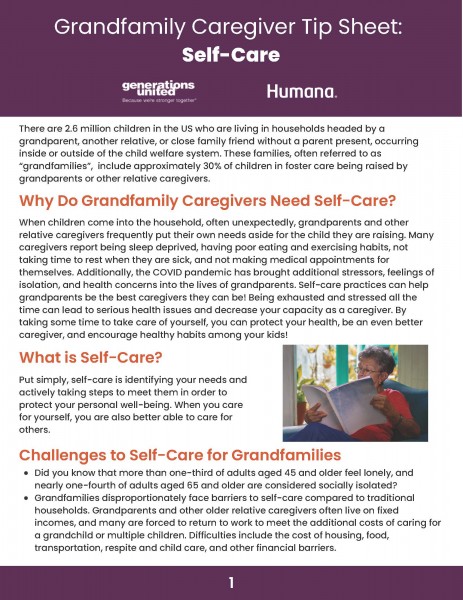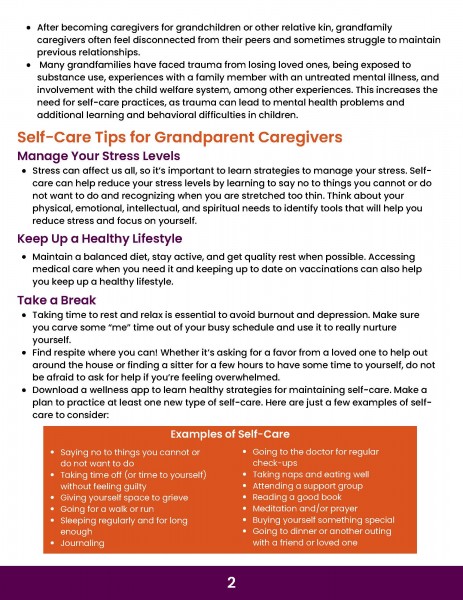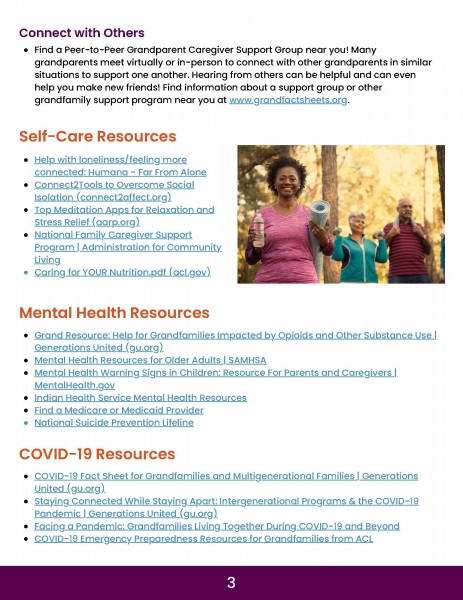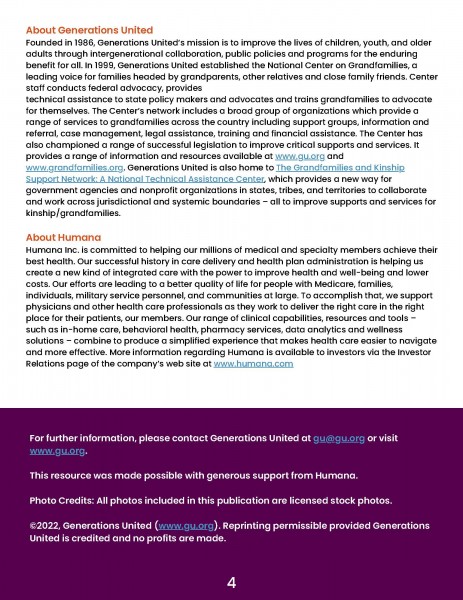Kinship Care: Caring for Yourself
September
Care During Grandparent Week

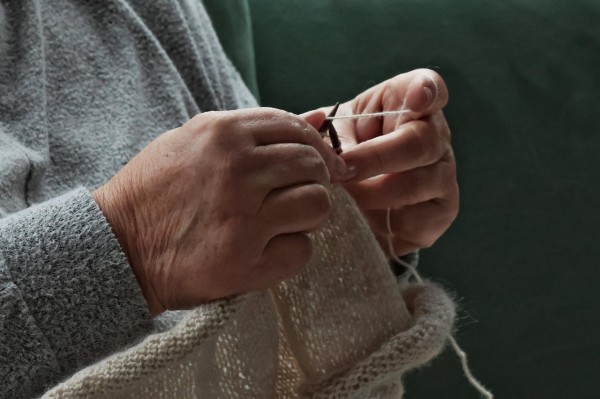
This Grandparent Week, take a journey to learn more about the value of experiencing “Grandma Hobbies” and the positive impact on our mental health for youth and grandparents. Time away from the “screen” is a benefit of this trend. Take a look at the suggested “hobbies” that make “old school” valued again!!
10 Cozy “Grandma Hobbies” Helping People Feel Less Anxious and More Grounded
Welcome to Week 1 of Mental Health Awareness Month.
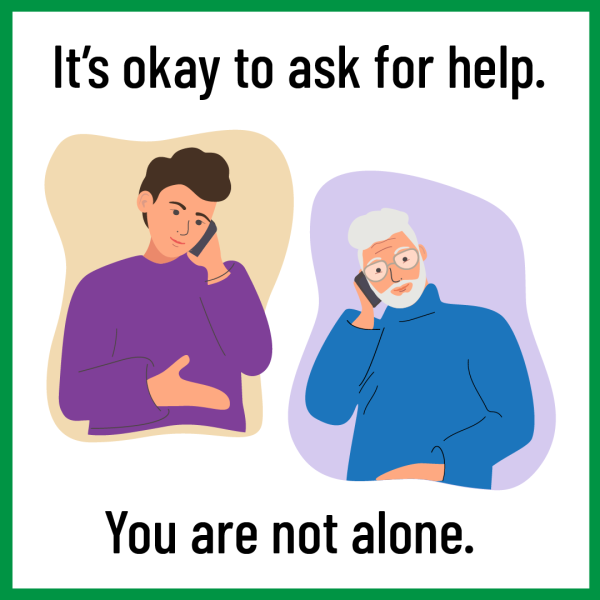 SAMHSA reminds us that older adults may face life changes—such as health challenges, retirement, or loss of a loved one—that affects emotional well-being. When following these life changes it is natural to have feelings of loneliness or grief; it is also important to acknowledge when these feelings become overwhelming or begin to impact day-to-day functioning. It is important to recognize the signs of depression or anxiety and seek support. These are key first steps toward managing symptoms, cultivating positive emotions, and sustaining a meaningful life. Remember, mental health is important at all ages and stages of life.
SAMHSA reminds us that older adults may face life changes—such as health challenges, retirement, or loss of a loved one—that affects emotional well-being. When following these life changes it is natural to have feelings of loneliness or grief; it is also important to acknowledge when these feelings become overwhelming or begin to impact day-to-day functioning. It is important to recognize the signs of depression or anxiety and seek support. These are key first steps toward managing symptoms, cultivating positive emotions, and sustaining a meaningful life. Remember, mental health is important at all ages and stages of life.
Global Intergenerational Week
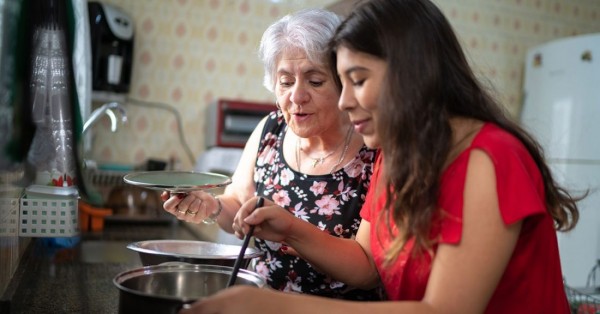 Join Generations United, The Eisner Foundation, and organizations around the world to celebrate Global Intergenerational Week! Global Intergenerational Week is an annual campaign celebrating all things intergenerational. The campaign inspires individuals, groups, organizations, and local/national governments to fully embrace intergenerational practice, connecting people of different generations in intentional, mutually beneficial activities.
Join Generations United, The Eisner Foundation, and organizations around the world to celebrate Global Intergenerational Week! Global Intergenerational Week is an annual campaign celebrating all things intergenerational. The campaign inspires individuals, groups, organizations, and local/national governments to fully embrace intergenerational practice, connecting people of different generations in intentional, mutually beneficial activities.
Global Intergenerational Week - April 24-30 - Generations United
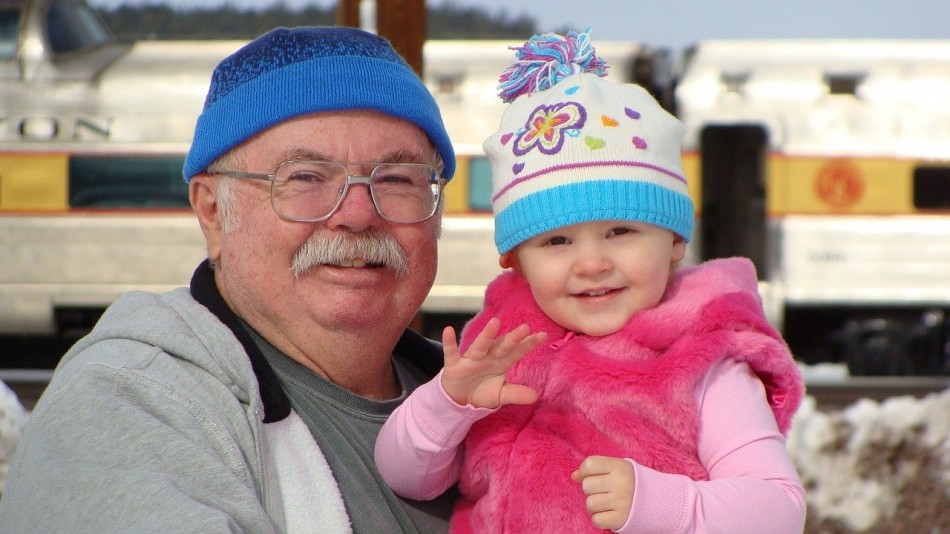 The Extended Family Support Program assists relative caregivers who are caring for their relative’s children who are not part of the child welfare system. Services include:
The Extended Family Support Program assists relative caregivers who are caring for their relative’s children who are not part of the child welfare system. Services include:
- Help obtaining guardianship.
- Help obtaining the Child Only Grant and other entitlements and benefits.
- Help enrolling the children in school.
- Referrals for other services.
- Cash assistance to obtain guardianship and to meet the child's basic needs.
To inquire about receiving EFSP services, call the DCFS Hotline at [Please enable JavaScript.]. We encourage you to say: "I am caring for my relative’s child. I have been caring for them for more than 14 days. The child is not being abused or neglected but I need help. I would like to be referred to the Extended Family Support Program." Please note, EFSP does not provide a monthly stipend.
Adoption Support and Education Holiday Support
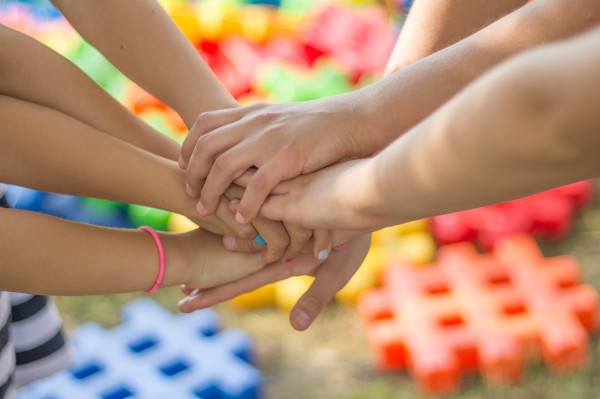 The holidays can be a time of both joy and sadness for adopted children and teens, exacerbating feelings of loss and difference. The meetings being offered by C.A.S.E. are virtual, one-time meeting support groups provide a safe space to share personal experiences and feelings, offer mutual support, and provide encouragement and comfort. C.A.S.E. has two support groups meeting in November – IFRC encourages you to learn more. Support our families with the holiday resources.
The holidays can be a time of both joy and sadness for adopted children and teens, exacerbating feelings of loss and difference. The meetings being offered by C.A.S.E. are virtual, one-time meeting support groups provide a safe space to share personal experiences and feelings, offer mutual support, and provide encouragement and comfort. C.A.S.E. has two support groups meeting in November – IFRC encourages you to learn more. Support our families with the holiday resources.
Sign up for the appropriate group at: Adoptive Parents Holiday Support Group - C.A.S.E. or Teen Adoptee Holiday Support Group - C.A.S.E.
Prepare for Celebrating Kinship
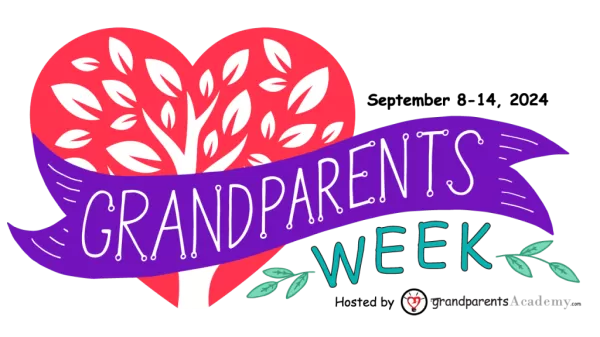 Generations United is excited to invite you to Grandparents Week. It is hosted by Generations United partner, GrandparentsAcademy.com. #DoSomethingGrand and celebrate Grandparents Day (Sunday, September 8, 2024) throughout the month of September!
Generations United is excited to invite you to Grandparents Week. It is hosted by Generations United partner, GrandparentsAcademy.com. #DoSomethingGrand and celebrate Grandparents Day (Sunday, September 8, 2024) throughout the month of September!
Are you ready to #DoSomethingGrand? Check out the official Grandparents Day Take Action Guide, Generations United created with support from “Far From Alone” and Humana, for tons of ideas on how you can celebrate intergenerational connections and make a difference in your families or communities. Grandparents Week is the largest virtual educational conference and celebration for grandparents of its kind. You’ll hear from over a dozen experts including Director of Grandfamilies & Kinship Support Network, Ana Beltran. There are also mini-classes and prizes lined up for this incredible event scheduled for Sept. 8 – 14, 2024. General Admission is free and there are giveaways going on for those who register in advance. Claim your ticket today!
June 2024
Keep Up the Good Work of Fostering and Kinship Care
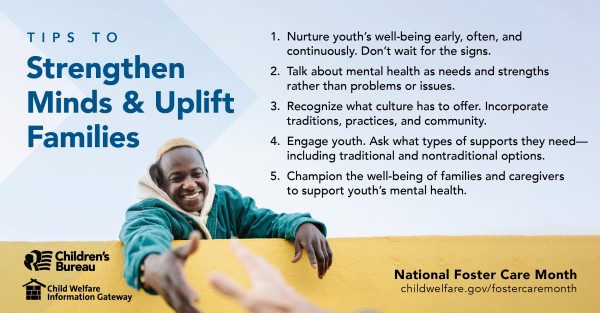 Even though we have moved through May and the National Foster Care Month, as grandparents, kinship or a foster care provider, let us remember the Tips to Strengthen Minds and Uplift Families as a way of supporting a successful and supportive relationship for our children and teens. The journey is not an easy trip for the care givers or the youth. Build HOPE AND SECURITY for our youth.
Even though we have moved through May and the National Foster Care Month, as grandparents, kinship or a foster care provider, let us remember the Tips to Strengthen Minds and Uplift Families as a way of supporting a successful and supportive relationship for our children and teens. The journey is not an easy trip for the care givers or the youth. Build HOPE AND SECURITY for our youth.
Check out: https://www.childwelfare.gov/
April 2024
Sesame Street Helps!!
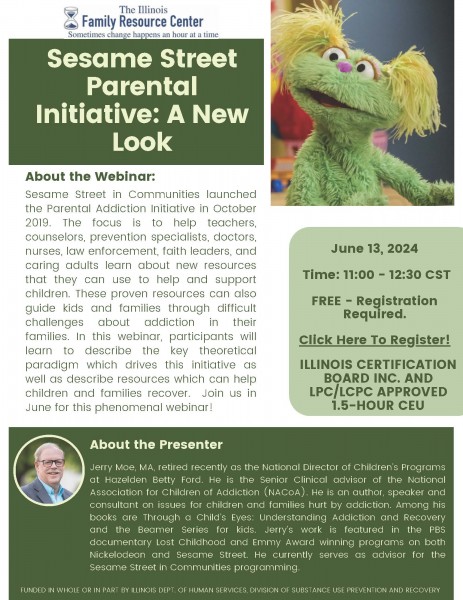 Check out the resources offered by Sesame Street in Communities. Jerry Moe will join us to share the strengths of the Sesame Street learning tools for families with chaos and trauma due to substance misuse. Don't miss this webinar for your support and those of the "littles."
Check out the resources offered by Sesame Street in Communities. Jerry Moe will join us to share the strengths of the Sesame Street learning tools for families with chaos and trauma due to substance misuse. Don't miss this webinar for your support and those of the "littles."
March 2024
The Importance of Play!!
“We don’t stop playing because we grow older; we grow older because we stop playing.”
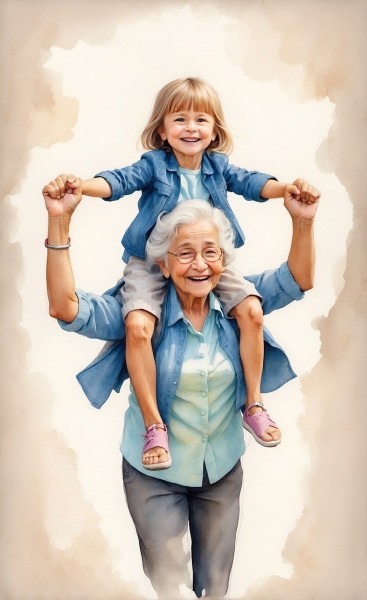 The Intergenerational Shared Site Network shares the following issue that focuses on creating intergenerational play spaces that foster cross-age connection, creativity, and learning. In addition to being fun, play provides people of all ages with social, emotional, and physical benefits, promotes empathy, and combats ageist stereotypes. The opportunities for designing and/or enriching intergenerational playful environments are endless.
The Intergenerational Shared Site Network shares the following issue that focuses on creating intergenerational play spaces that foster cross-age connection, creativity, and learning. In addition to being fun, play provides people of all ages with social, emotional, and physical benefits, promotes empathy, and combats ageist stereotypes. The opportunities for designing and/or enriching intergenerational playful environments are endless.
To learn more about intergenerational play, check out Play for All Ages: Designing Intergenerational Spaces That Build Connections and Encourage Learning.
February 2024
Did You Know?
 Grandfamilies, also known as kinship families, are families in which grandparents, other relatives, or close family friends raise children with no parents in the home.
Grandfamilies, also known as kinship families, are families in which grandparents, other relatives, or close family friends raise children with no parents in the home.- 4 million children are growing up in grandfamilies,
- 6 million live in households where another relative (not their parent) is head of the household. Grandfamilies are diverse and exist across various geographies, socio-economic statuses, races, and ethnicities.
- Research shows that between 2002 and 2019, grandparents reporting parents’ substance use as a reason for raising their grandchildren jumped from 21% to 40%.
Tips for Grandfamilies:
- Explore employer-based support
- Utilize school and community-based mental health supports:
- Obtain accurate diagnoses for mental health concerns:
- Find a grand family support group: Connecting with other grand families for support and understanding is critical;
- Tap into respite care: Grandfamily caregivers need respite—a break from caregiving—to manage chronic stress, take care of themselves, and “re-boot.” You can also search for a grandfamily respite program through the ARCH Respite network.
Learn more about the mental health concerns of grandfamilies and resources to help the families in Generations United’s 2023 State of Grandfamilies’ Report, Building Resilience: Supporting Grandfamilies’ Mental Health and Wellness at gu.org and gksnetwork.org.
Check out: 5 Tips For Grandfamilies Facing Mental Health Concerns (grandmagazine.com)
December 2023
Illinois Extended Family Support Program (EFSP)
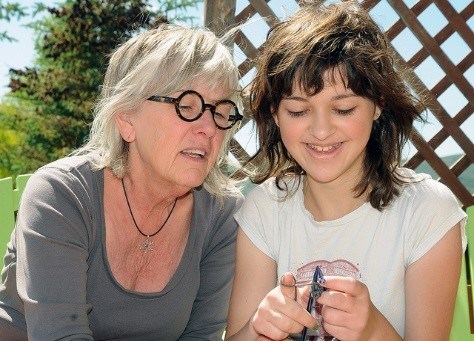 If you are a kinship caregiver and you are wanting some direction for possible services and/or resources, check out the Extended Family Support Program that assists relative caregivers who are caring for their relative’s children and who are not part of the child welfare system. Services include:
If you are a kinship caregiver and you are wanting some direction for possible services and/or resources, check out the Extended Family Support Program that assists relative caregivers who are caring for their relative’s children and who are not part of the child welfare system. Services include:
- Help obtaining guardianship.
- Help obtaining the Child Only Grant (TANF) and other entitlements and benefits.
- Help enrolling the children in school.
- Referrals for other services.
- Cash assistance to obtain guardianship and to meet the child's basic needs.
To inquire about receiving EFSP services, call the DCFS Hotline at [Please enable JavaScript.]. You are encouraged to say: "I am caring for my relative’s child. I have been caring for them for more than 14 days. The child is not being abused not neglected but I need help. I would like to be referred to the Extended Family Support Program." Please note, EFSP does not provide a monthly stipend.
For more information, contact the EFSP coordinator at [Please enable JavaScript.].
November 2023
Generations United Report
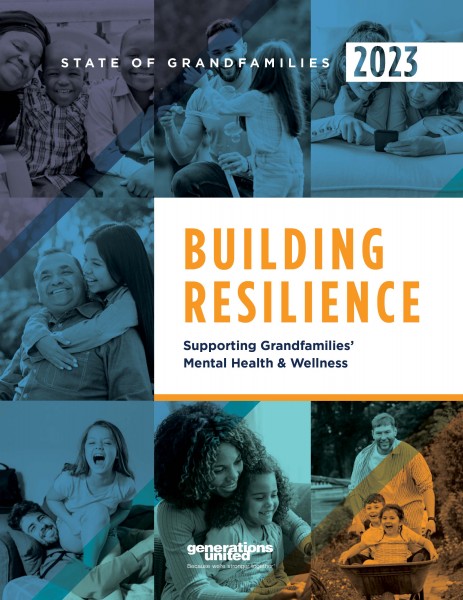 Over 2.4 million children in the United States are living in grandfamilies. These are families where grandparents, other relatives, or close family friends are raising children because the children’s parents are unable to do so. The report aims to bring attention to the mental health and emotional wellness of grandfamilies, shed light on their resilience and challenges they face, and provide innovative solutions and resources to better support them. The report also includes policy and program recommendations for strengthening these incredible families. Generations United released their yearly report on our generational kinship/grandfamilies this month. Check it out for important information and resources to support our families and communities.
Over 2.4 million children in the United States are living in grandfamilies. These are families where grandparents, other relatives, or close family friends are raising children because the children’s parents are unable to do so. The report aims to bring attention to the mental health and emotional wellness of grandfamilies, shed light on their resilience and challenges they face, and provide innovative solutions and resources to better support them. The report also includes policy and program recommendations for strengthening these incredible families. Generations United released their yearly report on our generational kinship/grandfamilies this month. Check it out for important information and resources to support our families and communities.
September 2023
Support Kinship Youth
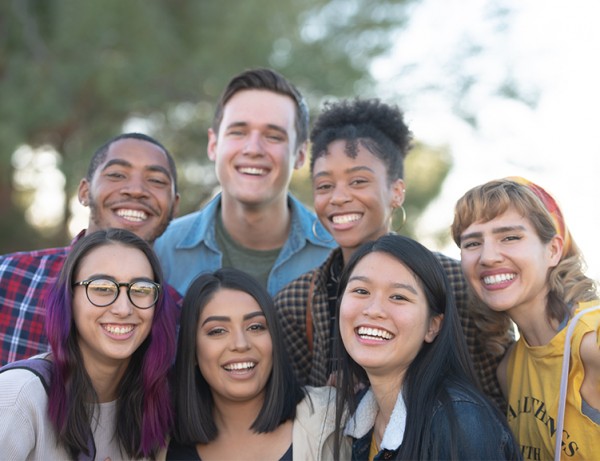 The November 2023 National Adoption Month campaign, "Empowering Youth: Finding Points of Connection," will raise awareness about the importance of professionals and communities in building relationships with youth who are in foster and kinship care to create tools to keep and form lifelong connections that will support and affirm youth as they explore who they are holistically. As families and communities plan to build protective environments for their youth and prevent substance use, check out the tools to help youth feel valued and loved in your community.
The November 2023 National Adoption Month campaign, "Empowering Youth: Finding Points of Connection," will raise awareness about the importance of professionals and communities in building relationships with youth who are in foster and kinship care to create tools to keep and form lifelong connections that will support and affirm youth as they explore who they are holistically. As families and communities plan to build protective environments for their youth and prevent substance use, check out the tools to help youth feel valued and loved in your community.
Visit Children’s Bureau (CB) | The Administration for Children and Families (hhs.gov)
July 2023
Kinship Care Defined
 Do you know what kinship care is? Do the terms referring to you as a caregiver confuse you? Kinship care is when relatives step up to raise children when their parents can’t care for them for the time being. The Annie E. Casey Foundation shares that today, more than 2.5 million children are in kinship care in our country. If you were raised by a grandparent, an aunt or a close friend, you were raised under kinship care. Compared to children in the general foster care population, kids in kinship care tend to be:
Do you know what kinship care is? Do the terms referring to you as a caregiver confuse you? Kinship care is when relatives step up to raise children when their parents can’t care for them for the time being. The Annie E. Casey Foundation shares that today, more than 2.5 million children are in kinship care in our country. If you were raised by a grandparent, an aunt or a close friend, you were raised under kinship care. Compared to children in the general foster care population, kids in kinship care tend to be:
- Better able to adjust to their new environment;
- Less likely to experience school disruptions;
- Less likely to experience behavioral and mental health problems;
- More stable — they move less than kids in nonfamily foster care settings and have lower rates of re-abuse;
- More likely to stay with their siblings and maintain lifelong connections to family.
Importantly, kinship care also helps to minimize trauma for children as well as preserve their cultural identity and connections to their communities.
Resources:
- Five Ways to Help Kinship Caregivers Now
- Coping with the Unique Challenges of Kinship Care (a four-part video training series) Training Series: Coping With the Unique Challenges of Kinship Care - The Annie E. Casey Foundation (aecf.org)
Learn more on Kinship Care - The Annie E. Casey Foundation (aecf.org)
May 2023
Aging Network Services and Supports for Kin/Grandfamily Caregivers
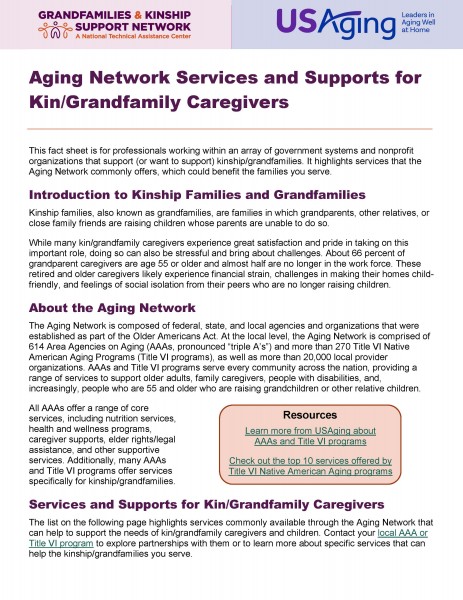 While many kin/grandfamily caregivers experience great satisfaction and pride in taking on the kinship role, doing so can also be stressful and bring about challenges. About 66 percent of grandparent caregivers are age 55 or older and almost half are no longer in the work force. These retired and older caregivers likely experience financial strain, challenges in making their homes child[1]friendly, and feelings of social isolation from their peers who are no longer raising children. Generations United has identified services to help through the Aging Network. Contact your local AAA or Title VI program to explore partnerships with them or to learn more about specific services that can help the kinship/grandfamilies you serve.
While many kin/grandfamily caregivers experience great satisfaction and pride in taking on the kinship role, doing so can also be stressful and bring about challenges. About 66 percent of grandparent caregivers are age 55 or older and almost half are no longer in the work force. These retired and older caregivers likely experience financial strain, challenges in making their homes child[1]friendly, and feelings of social isolation from their peers who are no longer raising children. Generations United has identified services to help through the Aging Network. Contact your local AAA or Title VI program to explore partnerships with them or to learn more about specific services that can help the kinship/grandfamilies you serve.
April 2023
Visit: www.gu.org for more self-care information.
March 2023
Resources for You
 The "Grandfamilies & Kinship Support Network: A National Technical Assistance Center" uses the terms “grandfamilies” and “kinship families” interchangeably to refer to families in which grandparents, other adult family members, or close family friends are raising children, with no parents in the home. The parents are not caring for their children for many reasons, including parental substance use, incarceration, military deployment, severe disability, deportation, teenage pregnancy, or death. At least 2.6 million children are being raised in these families across the United States.
The "Grandfamilies & Kinship Support Network: A National Technical Assistance Center" uses the terms “grandfamilies” and “kinship families” interchangeably to refer to families in which grandparents, other adult family members, or close family friends are raising children, with no parents in the home. The parents are not caring for their children for many reasons, including parental substance use, incarceration, military deployment, severe disability, deportation, teenage pregnancy, or death. At least 2.6 million children are being raised in these families across the United States.
To access the resources and information available, check out: Who Are Grandfamilies and Kinship Families? - Grandfamilies & Kinship Support Network (gksnetwork.org).
February 2023
Self-Care Tips
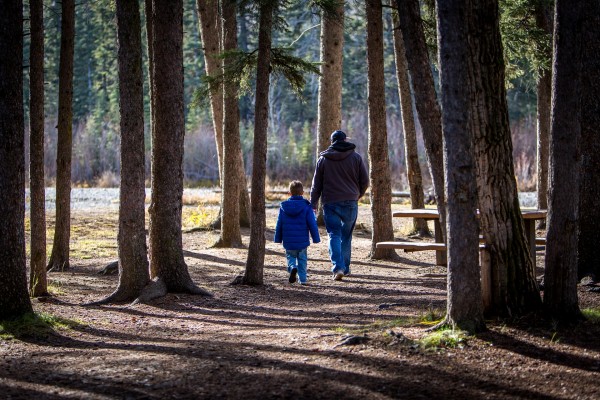 It is reported there are 2.6 million children in the US who living in homes headed by a grandparent, other adult family members, or close family friend without a parent present. These occur both inside and outside of the child welfare system. These families include approximately 30% of children in foster care being raised in kinship families. Even in the best kinship family situations, self-care is vital. For health, physically and mentally, take a look at the tips offered by Generations United and Humana. With many of the “grandfamilies” generated by chaos and substance misuse in the child’s environment, setting an example by self-care is a strength to success of the kinship family.
It is reported there are 2.6 million children in the US who living in homes headed by a grandparent, other adult family members, or close family friend without a parent present. These occur both inside and outside of the child welfare system. These families include approximately 30% of children in foster care being raised in kinship families. Even in the best kinship family situations, self-care is vital. For health, physically and mentally, take a look at the tips offered by Generations United and Humana. With many of the “grandfamilies” generated by chaos and substance misuse in the child’s environment, setting an example by self-care is a strength to success of the kinship family.
January 2023
Al-Anon Support
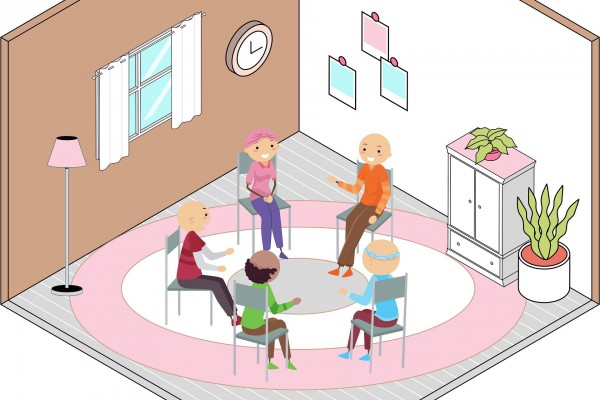 If you live in the chaos of substance use in your family, One Day at a Time in Al-Anon reminds us that arguments are useless against a sickness. “I pray to remember, every day, every hour, and especially in times of crisis, that hostile behavior on my part will only add fuel to a fire that could destroy us both.” As a grandparent or another person providing kinship care, you need to take care of yourself to provide the best care and support to your "littles" and their parents.
If you live in the chaos of substance use in your family, One Day at a Time in Al-Anon reminds us that arguments are useless against a sickness. “I pray to remember, every day, every hour, and especially in times of crisis, that hostile behavior on my part will only add fuel to a fire that could destroy us both.” As a grandparent or another person providing kinship care, you need to take care of yourself to provide the best care and support to your "littles" and their parents.
Visit: https://al-anon.org
January 2023
FREDLA
 Are you a family leader with lived experience as a primary caregiver of a child, youth, or young adult with mental health or substance use needs due to use or parental use? Are you working in a role that fosters and supports family engagement in agency practice and policy decisions? This may be as a foster parent, kinship caregiver, or as your work focus. If so, are you interested in connecting with other family leaders working in similar roles to expand and enhance your skills and knowledge? The Family-Run Executive Director Leadership Association (FREDLA) offers a peer networking group to share experiences, innovative and effective practices, skills and knowledge, solution to barriers and challenges, and key information supporting your role as family leaders.
Are you a family leader with lived experience as a primary caregiver of a child, youth, or young adult with mental health or substance use needs due to use or parental use? Are you working in a role that fosters and supports family engagement in agency practice and policy decisions? This may be as a foster parent, kinship caregiver, or as your work focus. If so, are you interested in connecting with other family leaders working in similar roles to expand and enhance your skills and knowledge? The Family-Run Executive Director Leadership Association (FREDLA) offers a peer networking group to share experiences, innovative and effective practices, skills and knowledge, solution to barriers and challenges, and key information supporting your role as family leaders.
The Family Exchange is a Monthly Peer Networking Group for Family Leaders Who Foster and Support Family Engagement. The group is facilitated by experienced family leaders from the Family-Run Executive Director Leadership Association (FREDLA) who foster peer connections; provide access to resources and technical assistance; and support participants to further family engagement within their agency, community, or state.
January Topic: Family Voice in the Ever-Changing Environment; Next Session: Wednesday, January 25, 2023 at CT 2:00 – 3:30
January 2023
Managing Your Emotions
 As a grandparent or kinship caregiver, your life has changed. Taking care of your mental health is a key component to managing your daily health, both physical and mental health. Practice self-care, seek a support group and be aware of he needs of your "little" charges along with you needs. Check out the extensive information on the Illinois Department on Aging and the resources you may access. Knowing what is available to help your family through the days ahead in vital and will make this process a valued experience for all of you.
As a grandparent or kinship caregiver, your life has changed. Taking care of your mental health is a key component to managing your daily health, both physical and mental health. Practice self-care, seek a support group and be aware of he needs of your "little" charges along with you needs. Check out the extensive information on the Illinois Department on Aging and the resources you may access. Knowing what is available to help your family through the days ahead in vital and will make this process a valued experience for all of you.
Grandparents Raising Grandchildren Program - Caregiver Support Program (illinois.gov)
December 2022
Racial Equity Toolkits
 Check out the Toolkits offered by Generations United. The Racial Equity Toolkits are designed to give resources and tips to child welfare agencies, other government agencies, and nonprofit organizations, so they can better serve all "grandfamilies"/kinship families. Generations United has produced a toolkit for American Indian and Alaska Native families, Black families, and Latino families.
Check out the Toolkits offered by Generations United. The Racial Equity Toolkits are designed to give resources and tips to child welfare agencies, other government agencies, and nonprofit organizations, so they can better serve all "grandfamilies"/kinship families. Generations United has produced a toolkit for American Indian and Alaska Native families, Black families, and Latino families.
Visit: Racial Equity Toolkits Featuring Grandfamilies - Generations United (gu.org).
November 2022
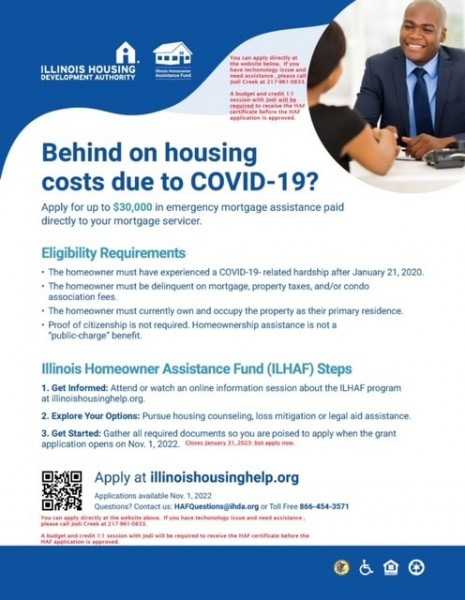 Grandparents, be sure to check out the resources for families in these times of stress. With winter approaching, housing is even more important. Keep you and your family safe especially if you are caring for little ones while their parents are unable. Visit: www.illinoishousinghelp.org.
Grandparents, be sure to check out the resources for families in these times of stress. With winter approaching, housing is even more important. Keep you and your family safe especially if you are caring for little ones while their parents are unable. Visit: www.illinoishousinghelp.org.
November 2022
Support for Families
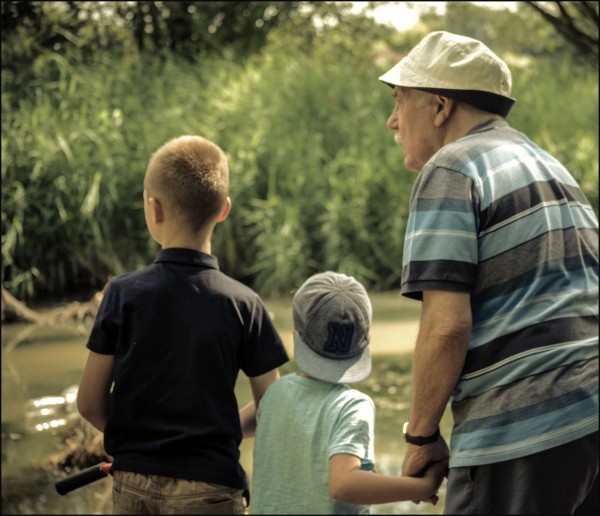 September was National Recovery Month and Kinship Care Awareness Month. This year’s National Recovery Month theme, “Every person. Every family. Every community.” reminds us that no one is immune to the risks and impact of substance use disorders (SUDs), mental health issues and the impact of gambling. As a result, when parents can no longer care for their children, there is no one better matched to step in than grandparents, other adult kin, or close “family-like” friends. But providing that care can come at a cost to the caregivers’ own physical, mental, and financial health and well-being. To help, ACL released the first-ever National Strategy to Support Family Caregivers. It was developed through a collaboration of the Advisory Council to Support Grandparents Raising Children and the Recognize, Assist, Include, Support, and Engage (RAISE) Act Family Caregiving Advisory Council. Find out more about the support developing nationally and the importance of being involved.
September was National Recovery Month and Kinship Care Awareness Month. This year’s National Recovery Month theme, “Every person. Every family. Every community.” reminds us that no one is immune to the risks and impact of substance use disorders (SUDs), mental health issues and the impact of gambling. As a result, when parents can no longer care for their children, there is no one better matched to step in than grandparents, other adult kin, or close “family-like” friends. But providing that care can come at a cost to the caregivers’ own physical, mental, and financial health and well-being. To help, ACL released the first-ever National Strategy to Support Family Caregivers. It was developed through a collaboration of the Advisory Council to Support Grandparents Raising Children and the Recognize, Assist, Include, Support, and Engage (RAISE) Act Family Caregiving Advisory Council. Find out more about the support developing nationally and the importance of being involved.
October 2022
What is the most important thing in Hispanic culture?
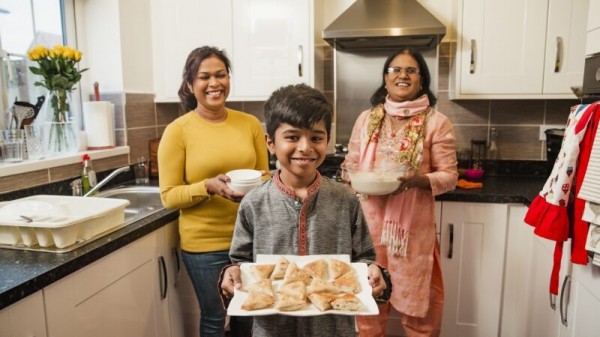 Do you Know? PBS Kids invites you to celebrate Hispanic Heritage Month. Each year, Americans observe National Hispanic Heritage Month from September 15 to October 15, by celebrating the histories, cultures and contributions of American citizens whose ancestors came from Spain, Mexico, the Caribbean and Central and South America. Honoring family traditions is important to kids and grown-ups across backgrounds and cultures. Sharing special traditions can strengthen family bonds and create a sense of belonging to children and grown-ups. Traditions can help us connect with cultural or religious roots. They are often shared and passed on to others — sometimes through generations.
Do you Know? PBS Kids invites you to celebrate Hispanic Heritage Month. Each year, Americans observe National Hispanic Heritage Month from September 15 to October 15, by celebrating the histories, cultures and contributions of American citizens whose ancestors came from Spain, Mexico, the Caribbean and Central and South America. Honoring family traditions is important to kids and grown-ups across backgrounds and cultures. Sharing special traditions can strengthen family bonds and create a sense of belonging to children and grown-ups. Traditions can help us connect with cultural or religious roots. They are often shared and passed on to others — sometimes through generations.
Family traditions can include activities, recipes, and acts of kindness. They can be done at any time to celebrate anything! Want to start a new tradition with your family? Make it simple and not stressful. Your new tradition can be daily, weekly, monthly, or set for special holidays. Involve your kids in making family traditions and then share them with other family members. The most important thing in Hispanic culture… Traditionally, respect for one's elders and authority figures is an essential aspect of Hispanic culture. Additionally, Hispanic culture places much importance on the concepts of self-respect, dignity, and pride.
Learn more at: What Are Your Favorite Family Traditions? |… | PBS KIDS for Parents.
August 2022
The Lifeline Works
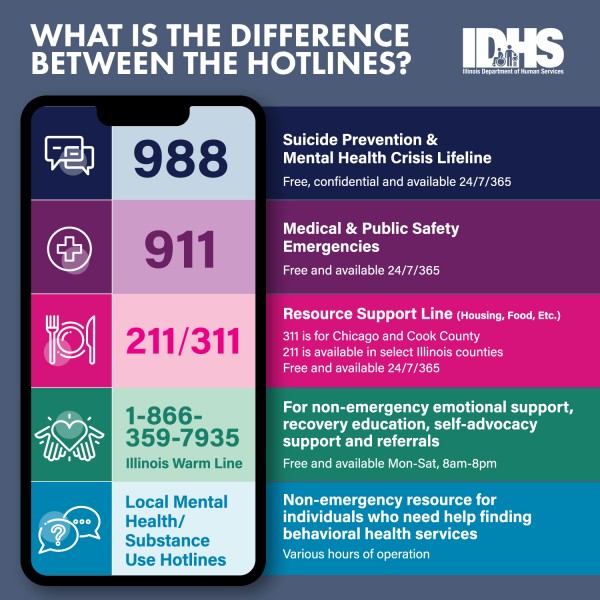 Are you or someone you know having thoughts of suicide or experiencing a mental health or substance use crisis? 988 connects you to compassionate, confidential support for free. 988 is the new three-digit dialing code for the Suicide and Crisis Lifeline. For years, the Lifeline – formerly known as the National Suicide Prevention Lifeline –has answered tens of millions of calls and helped people overcome mental health-related distress. 988 is the same trusted resource. When you call, text, or chat 988, you’ll be quickly connected to trained crisis counselors who will listen to your concerns, provide support, and get you additional help if needed. There is HOPE. The Lifeline WORKS. You are not alone in crisis. Just call 988.
Are you or someone you know having thoughts of suicide or experiencing a mental health or substance use crisis? 988 connects you to compassionate, confidential support for free. 988 is the new three-digit dialing code for the Suicide and Crisis Lifeline. For years, the Lifeline – formerly known as the National Suicide Prevention Lifeline –has answered tens of millions of calls and helped people overcome mental health-related distress. 988 is the same trusted resource. When you call, text, or chat 988, you’ll be quickly connected to trained crisis counselors who will listen to your concerns, provide support, and get you additional help if needed. There is HOPE. The Lifeline WORKS. You are not alone in crisis. Just call 988.
JULY 2022
Grands Taking Care of Your Mental Health
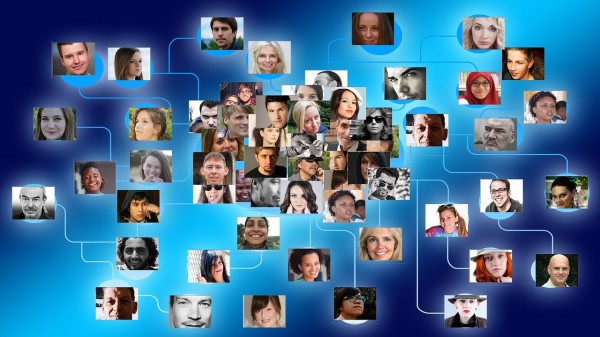 Beginning July 16, 2022, 988 the new three-digit dialing code connecting people to the existing National Suicide Prevention Lifeline, where compassionate, accessible care and support is available for anyone experiencing mental health-related distress—whether that is thoughts of suicide, mental health or substance use crisis, or any other kind of emotional distress. People can also dial 988 if they are worried about a loved one who may need crisis support. If you have questions regarding how this relates to other services or how to use the system.
Beginning July 16, 2022, 988 the new three-digit dialing code connecting people to the existing National Suicide Prevention Lifeline, where compassionate, accessible care and support is available for anyone experiencing mental health-related distress—whether that is thoughts of suicide, mental health or substance use crisis, or any other kind of emotional distress. People can also dial 988 if they are worried about a loved one who may need crisis support. If you have questions regarding how this relates to other services or how to use the system.
Check out: 988 Frequently Asked Questions | SAMHSA.
July 2022
Resources
 If you are a grandparent or other kinship caregiver, Generations United has updated their state fact sheets that include resources for assistance on this journey. take a minute to do an assessment of your potential needs (or wishes) and review the Generations United information.
If you are a grandparent or other kinship caregiver, Generations United has updated their state fact sheets that include resources for assistance on this journey. take a minute to do an assessment of your potential needs (or wishes) and review the Generations United information.
Visit: Illinois GrandFacts State Fact Sheet 2021 Update.pdf (grandfamilies.org)
February 2022
Grandfamilies are Great
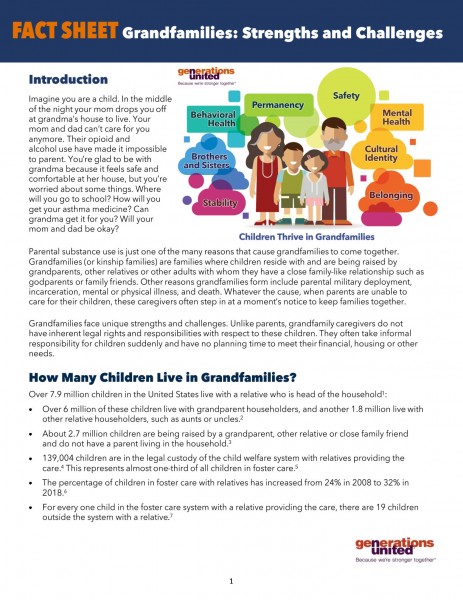 Generations United has shared news addressing the issue of grandparents and other relatives raising grandchildren. “Grandfamilies” are families in which children live and are being raised by grandparents or other extended family members with whom they have a family-like relationship. That may include godparents and close family friends. The data shows approximately 7.8 million children across the country live in households headed by grandparents or other relatives. About 2.5 million grandparents report they are responsible for their grandchildren’s needs. In about a third of these homes neither of the children’s parents are in the home.
Generations United has shared news addressing the issue of grandparents and other relatives raising grandchildren. “Grandfamilies” are families in which children live and are being raised by grandparents or other extended family members with whom they have a family-like relationship. That may include godparents and close family friends. The data shows approximately 7.8 million children across the country live in households headed by grandparents or other relatives. About 2.5 million grandparents report they are responsible for their grandchildren’s needs. In about a third of these homes neither of the children’s parents are in the home.
Despite facing many barriers, research shows that the children in "grandfamilies" thrive. Caregivers also experience benefits like an increased sense of purpose in life. Keep updated on grandfamilies news by signing up for their quarterly newsletter, The Grand Voice.
Visit and learn more about the new family generation. Grandfamilies - Generations United (gu.org). For additional information check out Relatives Raising Children/Extended Family Support - Loving Homes

